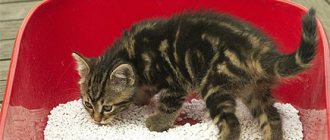8297Administration
3
There are cases when, having got a pet, the owners begin to notice that the kitten meows when it goes to the toilet. This phenomenon, if observed frequently, cannot but worry. It is important for cat owners to find out what reasons can provoke this cry in order to understand whether they need to go to the veterinarian, and why in certain cases this may not be done. It is unacceptable to ignore the phenomenon, since there are situations when the life of pets depends on timely assistance.
To attract attention
A continuation of infantile behavior associated with the toilet is that sometimes the kitten sits in the litter box and meows for no apparent reason.
He may not even go to the toilet. This problem is often associated with the fact that the cat is either still very small and is looking for food, but does not know where it is, or he attracts your attention - he needs affection or play. And it happens that the kitten plays in the litter box and frowns to itself
In any case, the kitten, firstly, should not be ignored. Instead, try to attract him with something outside the litter box so that the habit of sitting there and calling you doesn't become ingrained. Although most often it goes away on its own with age.
When to contact a veterinarian
The first signs that you need to take your kitten to the veterinarian are the following:
- Presence of blood in stool and urine.
- Long-term diarrhea or constipation.
- Systematic gag reflexes and elevated temperature (it can be determined by touching the kitten’s nose).
- Very frequent trips to the toilet.
If you have these symptoms, consult your doctor immediately and he will prescribe the correct treatment for your beloved pet.
Perhaps this is due to poisoning, a change in diet, or even contracting some kind of evil infection or disease. Remember! It is not recommended to diagnose and treat a kitten yourself under any circumstances! Entrust this work to professionals if you are worried about the life of your pet. If a kitten goes to the toilet, but cannot go to the toilet and begins to meow for a long time, this is a direct signal that it must be immediately taken to the veterinarian. This problem may be a sign that the kitten is experiencing pathological processes in the body. Also a symptom of many diseases is purulent discharge from the urinary organs. In this case, the kitten will need to undergo a series of long-term but effective treatments for its further full and healthy life.
the cat cannot go to the toilet in a small way - what to do?
How to find the reason?
If your cat begins to meow loudly and continuously, then first of all you should take a closer look and pay attention to the accompanying changes in her behavior.
- If a cat refuses to eat, although the bowl is filled with food, the animal is most likely hungry, but the food offered is not suitable for it.
- If a cat meows after refusing to go to the toilet for a long time, the pet is experiencing digestive upset.
- When a cat's crying is accompanied by a change in behavior, for example, it becomes lethargic or itches frequently, and also if the mucous membranes of its eyes become inflamed and its fur becomes dull, the animal is sick. Only a veterinarian can determine the cause of the disease.
- But if your pet begins to hide behind the furniture, cling to the walls, then he experiences fear - most often this happens when the cat finds itself in a new place of residence or when faced with cruel treatment from people.
- If a cat clings to the radiators and looks for warm places, the animal is frozen. If a furry friend begins to literally follow his owner with his tail, most likely, your friend is hinting that he wants to play with you or get his share of love and affection.
- During sexual hunting, cats begin to mark corners in the house, and cats stand in a “ready pose” and lift their tails.
- Cats are clean animals and will never go into a dirty litter box, so if the animal meows near the toilet, change the litter as soon as possible.
- Older cats often suffer from Alzheimer's disease. In this case, the animal often crashes into walls, stops responding to its name, and can stand in one place for a long time with a blank look, sometimes making loud noises.
What to do?
Methods of dealing with cat meowing directly depend on the reasons that cause it. Keep in mind that felines are primarily nocturnal animals. During the day they like to sleep, and at night they begin to run, rustle with bags, jump and flirt with the owner; if he does not reciprocate, they begin to scream and attack invisible enemies.
If the cat has all the signs of the disease, treatment can only be prescribed by a doctor who will conduct all the necessary examinations and select the necessary medications.
Affection, warmth and a friendly attitude will help you cope with the changed circumstances; if you wish, you can take a course of mild sedatives.
When the cat is cold, try to increase the air temperature in the room, and if this is not possible, arrange a warm house for the pet.
Coping with sexual heat will be much more difficult.
If you are against such radical measures as sterilization and castration, then ask your veterinarian to prescribe drugs that block heat, for example, Sex Barrier or Gestrenol. Keep in mind that they all contain hormones and have many contraindications, so many owners simply “get through” these turbulent days.
When a cat screams, it is strictly prohibited:
- succumb to her provocations - play or feed extra just to keep the pet silent;
- swear or spank the pussy - remember that these animals are very vindictive and “retribution” will not be long in coming;
- pour water on the animal;
- blow in the cat's nose.
To calm your pet you need a strong nervous system and excellent endurance. Try to keep your emotions under control and, even in the most tense moments, do not break down or yell at the cat, much less resort to violence. Only affection, understanding and love will help you cope with the problem and achieve the desired result.
The reasons why a cat may meow are listed in the video below.
How not to react to cats meowing
It’s clear that if these are the sounds of greeting, then all that remains is to enjoy them and accept the attention of your pet. In the absence of attention from the owner, the animal may become hysterical. Here only patience will become your main assistant. Try not to react to too loud exclamations, and start petting and playing only when the cat calms down. The sequence of your actions will ultimately lead to the pet becoming aware of its bad behavior.
The cat's heartbreaking cries may be due to the lack of appropriate incentives (long business trips, working late), and he is bored. Consider purchasing a companion. We are constantly in the company of people; for animals this is also a very important thing. It is better if the friend is of the right age, not too old. It will be easier for them to get used to each other.
It is worth setting a regular feeding time for your pet with a full bowl provided. If you break it and give food periodically, when the corresponding howls are already heard, this will be wrong. This way the cat will understand that this method works and will use it rather than other behavior.
An animal that is accustomed to freedom on the street, but is suddenly imprisoned at home “in a cage,” may begin to meow and tell us about its dissatisfaction. If you have stopped letting him out due to safety concerns or illness, then use leash walking. But this should be all year round: both winter and summer. Provide a place where the cat can easily express its hunting instinct - run and play (see how to equip it in more detail here).
Pets that do not communicate with their fellow animals must undergo a castration or sterilization procedure (read how they behave after the operation here). This will normalize the physical and mental health of cats, and you will no longer listen to intense vocalization.
Age-related changes occurring in animals suggest more and more frequent problems in the functioning of their internal organs. This naturally provokes too many nightly concerts. Therefore, after consulting your doctor, you need to take various pharmaceutical drugs to alleviate the conditions associated with aging. Constant observation and peace of mind of the owner is all that an older cat needs.
Most often, our reaction to our pet’s vocal performances is negative. We are sure that this is a situation of extortion or deliberately drawing attention to oneself. We wave, shout, scold, and sometimes hit with everything we can get our hands on. This should not be done under any circumstances!
It's better to figure out what happened than to ignore the problem. It is easier to prevent a disease than to treat it later. It is quite possible that meowing is associated, in particular, with a full tray, attempts to go outside, or an empty bowl of water. Check all the animal's needs before assuming it's solicitation.
Never, under any circumstances, scream, scare, or use violence against a purr because he is meowing. Only people with a low level of development behave this way. Therefore, when discussing why a cat walks around the house and meows for no reason, try to get to know your ward better, look for possible problems and try to solve them. Use positive approaches, but never negative ones.
READ Alpaca – Alpaca Animal – Characteristics of Alpaca
Reasons for screaming at night
If a cat only screams at night, then the reasons for this may be:
The most common and obvious reason is the period of sexual activity, the cat needs a sexual partner for mating. Most often, a cat yells for this reason only at night. And he will scream persistently and for a long time until he satisfies his desire. There are four options:
- Let the cat out and find your own partner.
- Organize a romantic meeting (it is worth remembering that everything should happen on the territory of the cat, not the cat).
- Give a hormonal drug for temporary loss of sexual function;
- Castration.
It is up to the owner to decide which method is more appropriate. Even if the cat gets what he wants, he may not stop yelling right away. And the most offensive thing is that some cats do not stop screaming even after castration, but cannot satisfy their desire. This desire arises “out of old memory.” To avoid this, it is better to castrate before a year, until puberty sets in and the cat has learned these instincts.
Daily routine is disrupted
More precisely, it is not impaired, but quite normal for cats. They are nocturnal animals; in nature, their relatives hunt at night. At night they see perfectly and move silently, which gives them a huge head start in hunting. Physiologically, they are very active at night, and during the day they are lethargic and sleepy. But having tried to really accustom them to the human regime. To do this, you need to play fun and active games with them more often during the day. And if the owner was at work all day, then the cat probably got a good night’s sleep and will throw a concert at night. The main thing is not to indulge his desires to play at night, otherwise he will take this as a green light for night games and will demand them even more persistently.
Lack of attention
Needs attention, is bored and wants to play a little and be cuddled. And during the day he didn’t get enough of it. Cats are living beings with emotions and a need for affection, and people are responsible for those they have trained. And if you plan to keep the cat exclusively in the apartment, then he should receive his share of affection and games with the owner. Cats love to run after something and love toys on a string.
The cat is spoiled
He's either used to everything revolving around him, or he just has a similar personality. You should start raising him, perhaps with the help of animal psychologists. If the above problems are not solved, then the screaming may begin during the day.
Or maybe health problems?
However, health problems can lead to constant meowing. They can occur at any age, and the difficulty is that you won’t be able to figure them out on your own. Only a consultation with a veterinarian will help here. Therefore, if your cat is yelling, take her to the clinic first, talk to a doctor and get the necessary tests. This will help avoid serious complications. What can cause a high-pitched meow?
Viral infections that can affect a cat at any age. They are accompanied by external signs: wheezing, lacrimation, nasal discharge. The body temperature rises, other symptoms cause her discomfort and she tries to tell the owner that she feels bad. Poisoning and parasites are very unpleasant for a furry pet. In this case, loss of appetite, stool disturbance, abdominal pain, and vomiting are noted. Parasites can be not only inside, but also on the skin and fur of the animal. Then he begins to itch and scream to tell his owner that he feels bad and unpleasant. Domestic cats are rarely injured, but no one is immune. These can be minor injuries to the paws, as well as serious fractures. Older cats are especially susceptible to them when joints and bones become fragile. Examine and feel your pet carefully and contact your veterinarian. Cats, like humans, can develop sand and stones in their kidneys. They cause a lot of unpleasant sensations for your pet when going to the litter box. He tries to inform the owner about this
Pay attention if your cat cries during this time and consult your doctor. It is difficult to go to the litter box even if you have cystitis.
Pain and discomfort
It happens that a cat screams when he poops, or seems to cry when he pees.
If you hear notes of pain, sadness, discomfort, dissatisfaction, etc. in your voice. sensations, it’s worth taking a closer look. The cat may have cystitis and urolithiasis if he screams when he pees. The situation is similar if a cat screams when it poops. If you hear screams before or after trying to pass a big meal, then something is wrong with your digestion. Most likely it is constipation or inflammatory bowel disease.
The first thing you must do is clearly understand: is the problem with the toilet due to a large need or a small one? Make an observation. Also look at the color of your urine and the quality of your stool. If there is blood in the urine or the stool is too hard, runny, or strangely colored, this is a reason to suspect a health problem. The posture during urination also indicates a problem with the bladder.
If there is blood in the urine, this is a sign of cystitis. Perhaps it is the underlying disease, or perhaps cystitis is a consequence of another disease. You cannot make a diagnosis yourself. You will have to visit the veterinary clinic and take several tests, including a urine test.
If the problem is in the act of defecation, and not in urination, and you see that the cat’s feces are too hard and dry, more like goat’s, then the pet is constipated. When stool comes out, it hurts. In this case, you need to reconsider the animal’s diet. Read about how to do this correctly to avoid constipation in a separate article.
There is no constipation, but the cat is still in pain? Then you will have to investigate with the help of a veterinarian, because... there are many options. This includes a tumor of the rectum, inflammation, worms, and much more. If you can deal with worms on your own by regularly giving anthelmintic drugs (once every 3-4 months), then other problems require the intervention of a professional.
The author of the article, Ekaterina Yugosh, is the editor of the Murkotiki website, a journalist with a felinological education (a felinologist is a specialist who studies cats). She received her felinological education according to the WCF (World Cat Federation) system. She raises a Scottish Straight cat and a Highland Fold cat, as well as a Miniature Schnauzer dog. Her areas of in-depth interests include zoodietology and zoopsychology.
Why does blood appear in urine?
The appearance of blood in the urine, or hematuria, is an alarming symptom indicating the development of a serious pathology. Blood appears in urine due to various reasons:
- Injury. With a strong blow, damage to internal organs and blood vessels can occur, and blood begins to penetrate into the bladder.
- Urolithiasis disease. When stones and sand leave the kidneys, the walls of the urinary tract are damaged. This condition is often aggravated by the addition of an infection.
- Cystitis. Blood appears when the pathology is advanced.
- Long-term use of potent drugs. If blood clots appear, you must stop taking the drug and contact your veterinarian to adjust the therapy.
- Blockage of the urinary canal. The pathology occurs as a result of a long-term inflammatory process in the urethra.
- Malignant neoplasm. Most often observed in cats in adulthood.
Why does a cat constantly meow?
If a kitten meows constantly, then it yearns for its mother.
- Yearning. A small kitten, recently separated from its mother, will be very homesick for her at first. It is not surprising that during the first days of his stay in his new home he will “cry”, very pitifully and loudly. At this time, he needs a lot of attention and care, distractions in the form of toys, etc.
- Anxiety. Bustling around rooms, accompanied by loud meowing, may indicate that cats are feeling something alarming. Perhaps this is an approaching natural disaster or some serious event. However, there are weather-sensitive individuals that react in this way to changes in the weather.
- Disease. If an already middle-aged male or female cat, long past puberty or having successfully survived castration (sterilization), suddenly begins to scream loudly, most likely this is a sign of some kind of disease that is tormenting the animal.
Alzheimer's disease
In old age, this is usually a nervous disorder or Alzheimer's disease. You can alleviate your pet's condition with the help of special medications prescribed by a veterinarian.
The cat signals acute pain or injury
This cat injured his paw and meowed until his owner noticed it and took him to the vet.
You need to carefully examine it, in particular, the stomach - it should be soft, and with gentle pressure it should not cause discomfort in the animal. If the cat furiously scratches the owner during palpation, and his abdomen resembles a dense drum, you should immediately go to the veterinarian.
Helminths (worms)
The cause of despondency and melancholy in a cat can be worms.
Helminths can cause severe anxiety for cats, especially at night. The presence of parasites in a pet leads to intestinal obstruction, causing severe pain. It is worth remembering that from the third week of a kitten’s life it is necessary to regularly carry out treatment for worms.
Often cats suffer from urolithiasis. Every time they try to go to the toilet, they begin to meow loudly and pitifully. A veterinarian will help to cope with the situation, to whom the sufferer should be taken as soon as possible.
Rarely, but there are still cases when a sterilized cat screams, demanding a cat. This happens due to the fault of a careless veterinarian who left part of the ovary during the operation.
Resentment towards the owner
The cat could be offended by the owner for his upbringing. Often, cat owners resort to punishment such as ear tugging.
Reaction to the owner's behavior. Unfortunately, not all cat owners treat their pets with kindness and care. When a kitten is small, it causes only tenderness, but, turning into an adult animal with its own habits and habits, it begins to irritate its careless owners.
As a result, the cat receives undeserved kicks and spanks. Anxiety and loud meowing in this case are just the cat’s way of protecting himself - in this way he is trying to scare you and drive you out of “his” territory. To restore peace and silence in the house, you need, first of all, to change your attitude towards your pet.
Why does a kitten scream when it goes to the toilet? What to do?
The cat gives the kittens a tummy massage with her rough tongue. If your kitten lives without a mother, 10-15 minutes after he eats, you should give the baby a gentle massage, stroking the tummy from top to bottom. If the mother cat has not accustomed the kittens to water, then you need to add a little water to everything you feed, or even with a double syringe, remove the needle, give water to the kitten after eating, holding it tightly with your hands and directing the stream of water to the corner of the mouth. Lack of fluid can cause constipation. This is why the baby can scream.
We recommend reading: Antibiotics for dogs with conjunctivitis
I have two kittens. I feed them the same, but they behave differently in the toilet. The boy calmly and quickly does his business, and the girl sits down for a long time and snorts with displeasure, she doesn’t like it when someone watches her. What if your kitten is not screaming in pain, but simply showing character? In any case, you need to monitor the quality of his nutrition. And it is advisable to consult not with amateurs, but with veterinarian specialists, because pets most often die from seemingly trivial gastritis than for any other reasons.
Usually, when a small kitten is separated from its mother and finds itself in an unfamiliar place, it always behaves this way. Since he is used to being looked after by his mother, but here he has to do everything himself, and for this reason, this makes him feel uncomfortable and nervous. At such moments, if you see that the kitten has begun to behave restlessly and needs a tray, then take him in your arms, calm him down and lightly massage his tummy (this is what a mother cat usually does), and then calmly take him to the tray. So that the kitten understands that this is not a dangerous place and that nothing will happen to it. It is also advisable to feed the kitten at this age both dry and liquid food. Dry food is needed to strengthen teeth, and liquid food is needed for normal digestion. The kitten may still scream because he doesn’t like the place where the tray is placed, the tray itself or the filler. For example, my cat is a little over 10 years old and he always starts yelling when he goes to the toilet. He digs and screams until he sits down. But he pees silently. He goes to sit down and pees. I checked the cat at the veterinarian and found no abnormalities. The cat's stool is normal and regular. Cats often scream when going to the toilet when they have worms. But they were not found in my cat. So it turns out that screaming is just something psychological. So my cat is already an adult, and yours, judging by the question, is still a kitten. Attention is the most important thing he needs now. And massage his tummy more often, this is very useful for kittens and adult cats. Since domestic cats are not very mobile, they experience constipation and therefore a tummy massage is necessary.
I have two kittens. I feed them the same, but they behave differently in the toilet. The boy calmly and quickly does his business, and the girl sits down for a long time and snorts with displeasure, she doesn’t like it when someone watches her. What if your kitten is not screaming in pain, but simply showing character? In any case, you need to monitor the quality of his nutrition. And it is advisable to consult not with amateurs, but with veterinarian specialists, because pets most often die from seemingly trivial gastritis than for any other reasons.
Why does a cat yell for no reason at night: what to do, the cat wakes you up at night and doesn’t let you sleep
Every owner of a furry pet has experienced the fact that his cat, for seemingly unknown reasons, suddenly starts screaming loudly at night and keeps everyone in the household from sleeping. Naturally, such behavior of a pet can irritate even the most patient owners.
Why does a cat yell for no reason at night?
But in fact, there are a number of reasons why a cat yells at night, and in order to effectively deal with this, you must first identify the cause of your pet’s anxiety.
What do adult domestic cats do during the daytime? Mostly they sleep! But cats are nocturnal predators and it is at this time of day that they are most active. At night, the pet rushes around the house, makes noise and plays pranks. And since he does not have a suitable company to play with and is overcome by boredom, he begins to wake up his owner with a loud meow, demanding that they play with him.
Late in the evening, give your pet a walk in the fresh air; this, by the way, will contribute to sound, healthy sleep not only for the cat, but also for its owner.
Under no circumstances should you punish a cat for yelling at night. Cats are quite vindictive animals and after punishment the pet will continue to scream at night simply out of spite.
When purchasing a furry pet, do not forget that it needs not only basic care and proper nutrition, but also attention.
Cats are extremely attached to their owners, giving them warmth and tenderness, but they also demand the same in return, because it is very important for them to feel needed and loved. If you don't devote enough time to your pet, he can become mildly depressed and even get sick.
And very often this is the reason why the cat starts screaming loudly and mournfully at night.
Source
ZooForum: The cat screams at night – ZooForum
Remember that by reacting to advertisements published here, you risk running into scammers who want to profit from the misfortune of others and the kindness of citizens.
The forum administration cannot verify the authenticity of ALL funds and their details. And it cannot prohibit the publication of such advertisements.
The attached topics contain announcements from those who collaborate with the forum administration and whose existence we have no doubt about.
We recommend reading: 2 balls near the nipple - false pregnancy
The cat screams at night although he doesn’t want anything
Hello everyone! Help! Since the beginning of winter, my two-year-old neutered cat has been yelling tirelessly at night in the hallway (I close myself off from him at night, because he doesn’t sleep at night, but gnaws at my legs and ears). He doesn't need food or communication, because... when I go out, he calmly goes to bed. He can scream all night and not get hoarse! This has never happened before; I don’t associate it with spring (why would he?). The impression is that he is yelling solely out of spite, in order to prevent me from sleeping. From months of insomnia, my mind is already going crazy. Help, explain what’s wrong with it and, most importantly, what to do with it. Thanks in advance everyone!
Well, that's not true! The cat, believe me, has no idea what’s bothering you. They cats are terrible individualists! He's bored, I think! Because when he sees you, he becomes silent and goes to bed. My kitty also always screams when I close myself off from him. There are many ways out: buy more toys; play with the cat in the evening so that he gets tired and sleeps peacefully; get a second cat (neutered) as a playmate (there will be a lot of dust, but one of my friends solved a similar problem this way); let the cat into your room and stoically endure the bites until he gets tired (and when he
Source
What can be done to alleviate the pet's condition?
Of course, when a cat cannot urinate, it is necessary to urgently take him to the veterinarian, but if this is not possible, then you can put a heating pad on the pet’s perineum and stomach.
Under no circumstances should you massage your cat’s tummy; these actions can only worsen your pet’s condition.
First and urgent aid is to insert a catheter to drain urine. This is a difficult and rather painful procedure and should only be carried out by a qualified specialist, and there are often cases of placing a catheter under general anesthesia. During catheterization, the bladder is washed with antiseptics. Frequent catheterization should not be performed because this procedure leads to swelling of the urinary tract, and as a result, the cat will not be able to urinate. Next, the veterinarian will determine the cause of this condition and prescribe treatment.
Diagnostics
After emergency measures are taken, the cat must undergo the necessary diagnostic procedures to identify an accurate diagnosis and prescribe the necessary treatment. Typically, a urine test is taken from the animal and an ultrasound scan of the abdominal organs, kidneys and bladder is performed.
If a cat does not walk for several days or does so rarely, then a large number of microorganisms multiply in his bladder. At first, the cat should be in a hospital so that stagnant urine can be professionally removed. Using injections, fluid is administered to the pet to eliminate dehydration. The veterinarian also prescribes antispasmodic drugs to help relieve pain and relax the urethra. Antibiotics and antibacterial agents are usually used to help relieve inflammation in the bladder. After treatment, the cat is discharged home, where all care falls on the owner.
Corrective diet
If a cat is susceptible to urolithiasis, then it needs a corrective diet. It is necessary that the food be rich in vitamins B6, A and glutamic acid. Food should not contain salt and minerals, namely:
- The cat should have a complete exclusion of salty foods.
- Raw fish and meat are prohibited.
- The consumption of all types of fish is excluded. Phosphorus, found in any type of fish, is deposited as an excess mineral in the bladder and leads to the formation of stones.
- Milk should not be consumed by a pet with urinary problems. The point is the increased magnesium content, which will lead to even worse urine flow.
- Pork is too fatty meat, it will lead to thickening of urine, which will further complicate its outflow from the bladder.
The cat should eat special dry food, balanced for animals with problems in the genitourinary system.
Risk categories
Problems with urination often occur in cats that have undergone castration as children. There are cases when urinary retention occurs in kittens, but according to statistics, adults most often suffer from this condition, especially in cats. If a newborn kitten has a problem with urine discharge, then the reason, as a rule, lies in congenital mechanical obstruction of the urinary tract.
What to do if your cat meows too much
If there is no one in the apartment during the day, then the animal is resting, and at night, most likely, it will disturb the sleep of others. A healthy, well-fed cat may meow at night for no reason, because she is bored.
Solving this problem is not difficult - you need to provide your pet with sufficient physical activity during the day. To do this, you can use special toys with sound or light effects.
Closer to night, it is recommended to feed the cat meat food. Digesting animal protein promotes sound sleep. Veterinarians recommend leaving food out at night not only for babies, but also for adult cats. A nightly journey to the food bowl calms even the most restless animals.
Owners often complain that their pet’s character deteriorates with age.
If an old cat is constantly yelling, you should pay attention to it. The following problems may have occurred:
The cat loses sight or hearing. Meowing, she asks her owner for help
If a deaf animal can move independently, then a blind pet will have to be constantly carried in your arms. A constantly meowing old cat requires increased attention and affection. Sore joints. The cat constantly yells because he experiences severe pain when moving. Diseases of internal organs
An animal that is in pain communicates this to its owner by meowing. You can try to treat your pet, give him painkillers prescribed by the veterinarian. Manipulation. Over many years of living together, the cat realized that if you meow long enough, you can achieve what you want.
Folk remedies for fighting orom
If your cat's constant meowing causes irritation and keeps you from sleeping at night, you can use decoctions of medicinal herbs, such as:
- oregano;
- sweet clover;
- valerian (rhizome);
- hop cones;
- motherwort;
- Melissa;
- peony.
All of them have a sedative effect, which does not appear immediately. But if you water a cat for a long time, you can count on a positive result - the animal will gradually calm down.
Medicines to calm you down
There are more effective ways to pacify a cat that is constantly yelling. It is almost impossible to calm screaming animals during the rut using folk remedies.
Veterinary pharmacies sell drugs that regulate sexual heat in cats:
- Stop intimate;
- Antisex;
- Sex barrier;
- Counter-sex.
These drugs act on the level of hormones in the animal’s blood, but they do not provide a long-term effect. An adult cat will need to take this medication regularly.
The “Cat Bayun” drops, which have a sedative, anxiolytic and antispasmodic effect, have proven themselves quite well. Thanks to the combined composition of the drug, a powerful calming effect is achieved. But with prolonged use of this remedy, a side effect may appear - the animal becomes lethargic and drowsy.
Causes
Problems with the gastrointestinal tract are observed in cats twice as often as in other pets. The most popular reason is a sedentary lifestyle. In the second position is frequent licking, which leads to the accumulation of hairballs in the gastrointestinal tract. Foreign bodies make it difficult to pass stones. Problems with defecation are possible at any age, but cats over 6 years of age are especially vulnerable.
Constipation is not an independent disease, but a symptom.
The following factors can provoke it:
- Unbalanced diet. Deficiency of vitamins, minerals and surplus of carbohydrates are common causes of deviations.
- Lack of fluid. The absence or insufficient amount of water slows down the digestion process. Feces dry out, become hard and scratch the intestinal lining.
- Accumulation of hairballs in the digestive tract. When licking, hairs enter and remain in the intestines.
- The presence of foreign bodies in the gastrointestinal tract. A cat may swallow a bone or small object that becomes lodged in the intestine and blocks the passage of feces.
- Pathologies. For inflammatory processes, diseases of the digestive and vascular system, metabolic disorders.
- The presence of tumors in the gastrointestinal tract and urinary system.
- Diabetes mellitus, excess weight, urolithiasis.
- Worm infestation. The presence and accumulation of worms in the gastrointestinal tract prevents the act of defecation.
- Infections.
- The body's response to stress.
It happens that a cat cannot go to the toilet before and after giving birth. In this case, the cause of the violation is compression of the organs. After lambing, the animal’s body is weakened, digestion is slow, plus, during feeding, the cat loses a lot of fluid, so delays in bowel movements of up to three days are quite justified.
To help your cat defecate after giving birth, you can add vegetable or petroleum jelly to the food. If there is no result within 24 hours, you must make an appointment with a veterinarian.
Often cats cannot go to the toilet after castration. The postoperative period is difficult for animals. After such an intervention, it is prohibited to add oil to the cat’s food. Such supplements are quickly absorbed by the body and can cause severe stomach upset.
After castration, defecation usually occurs within three days. These days the animal defecates little by little. In the postoperative period, the pet needs a soft diet so as not to put stress on the abdominal wall, since there is a risk of suture dehiscence.
The main reason for the absence of bowel movements after interventions is anesthesia. Animals take a long time to move away from him. In the first days after surgery, defecation is accompanied by pain.
Reasons for a kitten's constant meowing
The appearance of a kitten in the house means not only playing with a cute, fluffy animal, but also new, not always pleasant, worries. One of these problems sometimes becomes excessive “talkativeness” of a pet.
A gentle “meow” causes affection only for the first few minutes. If a kitten constantly yells and does not take breaks between day and night “concerts”, it is worth thinking about the reasons for this behavior.
Meowing is a way for cats to communicate with humans.
This is how the animal attracts the owner’s attention, asks for something or complains. The simplest reasons why a cat meows loudly:
Separation from mother. The optimal age for weaning a kitten from a cat is 2.5 months. In the case of continuous meowing, it is enough to pick up the baby, caress him, and make him a warm nest. In other words, replace his mother. Experiencing stress. The kitten screams in fear: a new place, smells, sounds. In this case, the owner’s task is to make it clear to the new family member that he is safe. Usually, in a friendly environment, the animal quickly adapts. Natural curiosity takes over, the cat goes to explore a new territory, forgets about the reasons for its fears and stops meowing. Hunger. By meowing, the pet reports that it is hungry. This is the most common reason. Kittens need frequent (6-9 times a day) meals and clean water. Food should also be left overnight. Toilet. A new family member wants, but cannot find a place. In this case, the baby needs to be fed and then placed in the tray. Kittens often have difficulty defecating
To make this process easier, just gently massage your pet's belly. Disease. If the cat is well-fed and caressed, but does not want to play, does not sleep and meows pitifully all the time, you should contact a veterinarian.
Reasons for meowing related to pathology
Often the reason why a kitten meows on the tray is various pathological phenomena. Some of them do not require treatment, while for others it is important to urgently visit a veterinarian .
- Digestive disorders . When a kitten is one month old, and upon moving to a new home, it is abruptly transferred from mother’s milk to regular food, it often develops constipation, which is associated with a rapidly changing consistency of stool. Normally, it takes 2-3 days before getting used to a new food. If this does not happen and the constipation does not go away, one owner will not be able to cope with the disorder, and a visit to the veterinarian will be required.
- Helminthic lesion . If there are worms in the intestines, the kitten experiences great discomfort at the moment when it visits the tray, since feces moving towards the anus causes strong movement of the parasites. The kitten meows for a long time due to incomprehensible and unpleasant sensations inside.
- Inflammation of the paranal glands . It does not occur often in kittens. When sick, the cat screams when it goes to the toilet, as well as from any touch to the area near the anus. A visit to the veterinarian is required urgently.
- Ulcers in the intestines . They cause severe pain in the animal when visiting the toilet and make the kitten meow. There are streaks of blood in the stool. A visit to the veterinarian should be urgent.
- Cystitis . Inflammation of the bladder is painful and provokes frequent, scanty urination, during which the pet often meows loudly due to cutting pain. Treatment of the disease is carried out only with the involvement of a veterinarian.
If your pet meows and shows restlessness on the tray, it is unacceptable to leave the situation unattended. To exclude possible pathologies, you should contact a veterinarian; and also from the breeder, when purchasing a kitten, you should always find out whether he is accustomed to different foods or still eats only mother’s milk.
Normal reasons include the following situations:
Learning to recognize signals: causes of cat meowing
With the help of the sounds it makes, the pet tries to say that it is worried about something and attract attention to itself. The most common reasons for this behavior are:
Mother's call. With the help of meowing, the mother cat communicates with the kittens even before their eyes open. With her voice, the tailed mother signals to the babies that it is time to eat. Or she can even “scream” if the furry baby is too naughty and is causing her pain. A cat can also express concern by screaming if it does not find the kitten in place. Seeking solitude. If the pet is just getting used to a new place, he may meow loudly and worry, looking for a suitable corner in the house to go to the toilet. When he has already settled in, but makes a loud meow while going to the litter box, this is a reason to show him to the veterinarian: a cry may signal problems with the pelvic organs and digestion. A way to attract attention. Cats accompany humans for a long time and do not feel well if they are not periodically stroked and given attention. Toys and a specially equipped corner for your pet will help solve the problem.
Well, and, of course, the cat needs to regularly devote time to communication and affection: this is very important for a pet. Hunger. This is a trivial reason
Usually, the animal also signals that it is hungry by jumping and clinging to clothes with its claws. The problem can be solved simply by feeding the pet. By the way, with a dissatisfied meow, he can “say” that he doesn’t like the food. Excitement. Moving, having a new pet in the house, or loud noises from the street can cause stress in the animal. Some cats lie in one place for a long time and breathe with effort, while others cannot hide their panic and scream loudly. In such cases, it is important to pay attention to the cat, caress your tailed friend once again, and give him a treat. If the situation does not return to normal, the help of a veterinarian will be required. Love. When ready to mate (estrus), cats will run and cry for a long time and uncontrollably. The “song” will be dominated by low and velvety rumbling notes. Additional indicators include rolling on the floor and rubbing against furniture. The problem can only be solved by selecting a partner, since both admonitions and punishment are powerless in the case of hormonal changes. The only solution is special drops. If the animal is not planned to be used for breeding, the cat can be sterilized, and the female cat can be neutered. Showing tenderness. By meowing, the cat tries once again to remind him of how much he loves his owner and how dear he is to him. Disease. Malaise can be caused not only by injury, but also by internal pathologies. If the scream becomes louder, you should not hesitate to go to the veterinary clinic. Excess adrenaline. During active games and pranks, the cat can forget itself and demonstrate its fighting spirit in such an accessible way. Conversation with relatives. A fairly common opinion among felinologists is that cats communicate only with people through sounds. But that's not true. Cats use meowing when interacting with their relatives to express their own emotions and scare away potential enemies.
Common Problems
There are quite a few nuances that explain this strange behavior of the animal. In any case, every breeder should clearly understand that cats don’t meow just like that - it’s a kind of cat language, and by making its guttural sounds, the animal tries to attract the attention of a person. If at the same time its appearance or behavioral characteristics change, it makes sense to take a closer look at your pet.
The development of viral, infectious and fungal diseases brings significant discomfort to animals; the cat first of all notifies about all the unpleasant processes occurring in the body with a loud meow.
The most common pathologies of furry animals are:
- infection with helminths - in this case, the animal not only makes loud sounds, the disease is often accompanied by vomiting, upset stool, trembling in the body and an attempt to “scratch” the anus on the sofa or carpet;
- problems with the gastrointestinal tract - when a cat meows before or during visiting the tray, most likely, the process of emptying is difficult for him, and this directly indicates pathological processes in the body;
- tick infestation - in this case, the cat not only screams, she also rushes around the apartment and scratches her ears and face until she bleeds;
- viral diseases - first of all, they manifest themselves in the hoarse voice of the animal, while the pet most often lies motionless, refusing not only to eat, but even to move.
Psychological
Often the cause of loud meowing is the usual spoiling of the pet. Owners who, from early childhood, have accustomed their cat to an excess of affection and attention, after a while begin to pay for their mistakes - the cat is accustomed to getting everything it wants at the first call, and if for some reason it does not see such a familiar reaction , this angers her. She tries to achieve what she needs, accompanying her demands with loud screams.
In such a situation, there is only one way out - to gradually retrain your cat, showing her that indulging all her whims is no longer welcome.
It especially often occurs in small kittens separated from their mother - during the first time they are in a new place of residence, the baby is sad, often cries, quite loudly and very pitifully. At this moment, he needs human support, attention, affection and distracting games.
Anxiety – if an animal begins to fuss, move from room to room and make loud sounds at the same time, then, most likely, the pet anticipates the approach of some unpleasant event: a natural disaster or misfortune.
In addition, there are weather-sensitive cats that react to changing weather conditions with loud sounds.
Very often, cats respond with their “meow” to the insufficiently good behavior of their owner. Unfortunately, not all breeders treat their pets with care and concern - while the kitten is small, it causes delight and tenderness, and when it becomes big and shows character, it begins to cause irritation and receive spanks and even kicks. In this case, a loud cry becomes a way for the cat to defend itself - it tries to “scare” its owner and drive him away from his individual space.
READ Why does miscarriage happen in a cat and how the owner can help
In this case, it is very important to change your attitude towards your four-legged friend.
First aid
Among the pets there are both silent and talkative ones. Some of them isolate themselves with their problem and lie quietly in a corner, while the owner puzzles over what could have happened. And others loudly report an uncomfortable state, however, this situation also drives people crazy.
The main thing is to know that a cat screams for a reason. It is important to detect it and help your pet cope with it. Even if it’s just a whim, you need to evaluate why she’s capricious and show maximum attention.
The cat is constantly yelling. What to do?
It’s not pleasant that your pet is constantly yelling. But what to do in this case? Fight or let it slide? First you need to find out the reason, maybe you will find it after all. In fact, cats have few needs: feed her if she’s hungry, cuddle her if she’s bored, play if she’s in a playful mood. It's nothing big for you, but it means so much to the animal.
Perhaps it’s enough for the cat to buy a new toy, treat or vitamins.
On your part, of course, attention and a little patience are required. It just seems that she is indignant constantly and for no reason
They exist, but they are probably not on the surface. Start with yourself; screams and high-pitched meows may be the result of the upbringing that you have instilled in the animal from the age of a kitten. A spoiled pet behaves no better than a spoiled child.
How to calm an animal
The pet's continuous and intrusive yelling is quite annoying. It not only disrupts the sleep a person needs, but also interferes with concentration on daily activities and provokes destructive affective states. Knowing how to effectively calm a cat is not only beneficial for the health of its owner, but also for the animal itself. Depending on the cause, there are several ways to tame purring.
Joint leisure
Despite the fact that cats are self-sufficient creatures, they easily become attached, and, moreover, they tend to choose an object of adoration for themselves. Having a pet means taking responsibility for its physical and psychological condition. If your pet is ignored and left alone for a long time, it will demand legitimate attention, notifying the outside world about it. In this case, it’s easy to wean an animal off screaming – just spend time with it, play, and communicate. If a four-legged animal has developed hunting instincts, then active and even aggressive games will help; calmer animals are sometimes simply enough to be picked up.
Correct daily routine
In some cases, the cause of a noisy problem may be the lack of a routine consistent with that of furry owners. If a cat sleeps all day on a sunny windowsill, then it is logical that its active phase will begin in the dark, when the owners, tired after work, want to rest. However, they will not be able to do this, since the animal, full of energy, will begin to waste energy in every possible way and ask for food. This incarnation of a nightmare can only be calmed down by working on the correct diet and wakefulness.
Consultation with a veterinarian
As mentioned above, the cause of meowing can be physical discomfort and pain, which should not be present in healthy animals. If the root of the problem cannot be found in matters of communication and scheduling, a trip to the veterinarian is the best solution.
Cats, like people, have introverts and extroverts.
If you do not have a clearly defined answer to the question of why a cat constantly meows, tied to a specific occasion (the cat is hungry, wants to drink or wants to go for a walk), then pay attention to the simple fact that meowing is one of the ways of cat communication. Some cats just love to talk
Some cats just love to talk
By making the sound “meow”, a cat communicates with a person or other pets. Among cats, as among people, there are individuals with different temperaments. Some are self-contained, patient silent people (introverts), who silently suffer from hunger, thirst, and pain. It is necessary to show maximum attention to such animals - not only add food in a timely manner and change the water in the bowl, but also check their health status and play with the pet more often.
Others are emotional extroverts who announce problems right away, loudly and at any time of the day. Such cats simply love to talk, and a stream of continuous “meows” may mean that they are sharing their impressions with their owners or talking about their plans for the day. If you notice that your pet is excessively emotional and desires to communicate, do not ask why the cat constantly meows.
Among cats there are individuals with different temperaments
One of the characteristic features of talking cats is to respond to the voice of their owner. They can behave calmly and remain silent until the moment you remain silent. But as soon as you answer the phone or start communicating with household members, the cat immediately joins the dialogue. And stopping him turns out to be difficult.
cats and their habits
I have long been bothered by the question of why cats, before going to the toilet to poop, run around the apartment, demolishing everything in their path, screaming like crazy, and only then perform the action of freeing the body from accumulated waste. A?
Answered: 52
But I’m wondering if it’s just me or all cats in general who spend a long time and diligently “burying” the litter box (and it’s not the litter that’s digging, but the walls of the litter box), so much so that he runs all over the restroom. At the same time, there is an incredible roar, which is especially offensive in the early morning. ((And only after this whole procedure (which can last about 15 minutes), the above-described action begins, with a plaintive meow as well. Apparently, he is offended that it was not possible to bury it, and demands that they clean up after him.
It’s strange, but mine always does the opposite: first it goes, and only then runs around the apartment with burning eyes, like a crazy woman, and wraps itself in rugs :))
There are 2 animals - a cat and a cat. The cat is calm, but the cat constantly races before the process of emptying. The stsuko is also stomping.
We have one cat that behaves exactly like this, the second one is not so energetic, so he walks quietly so that no one hears or sees. and then rake in with a roar.
I had 4 cats and a cat. The fact that they were in the toilet could only be known by the smell. Neither before nor after there was or was any running or yelling.
My cat DOES run around like crazy :))))) and in a small way he goes to the bath (into itself), but in a big way he rushes knocking everyone into the corridor, there is a cup of sand: D and intensively both this and that buries :)))
my cat does the same thing - BEFORE and sometimes after. It's been like this for 12 years. I always thought it was his character











